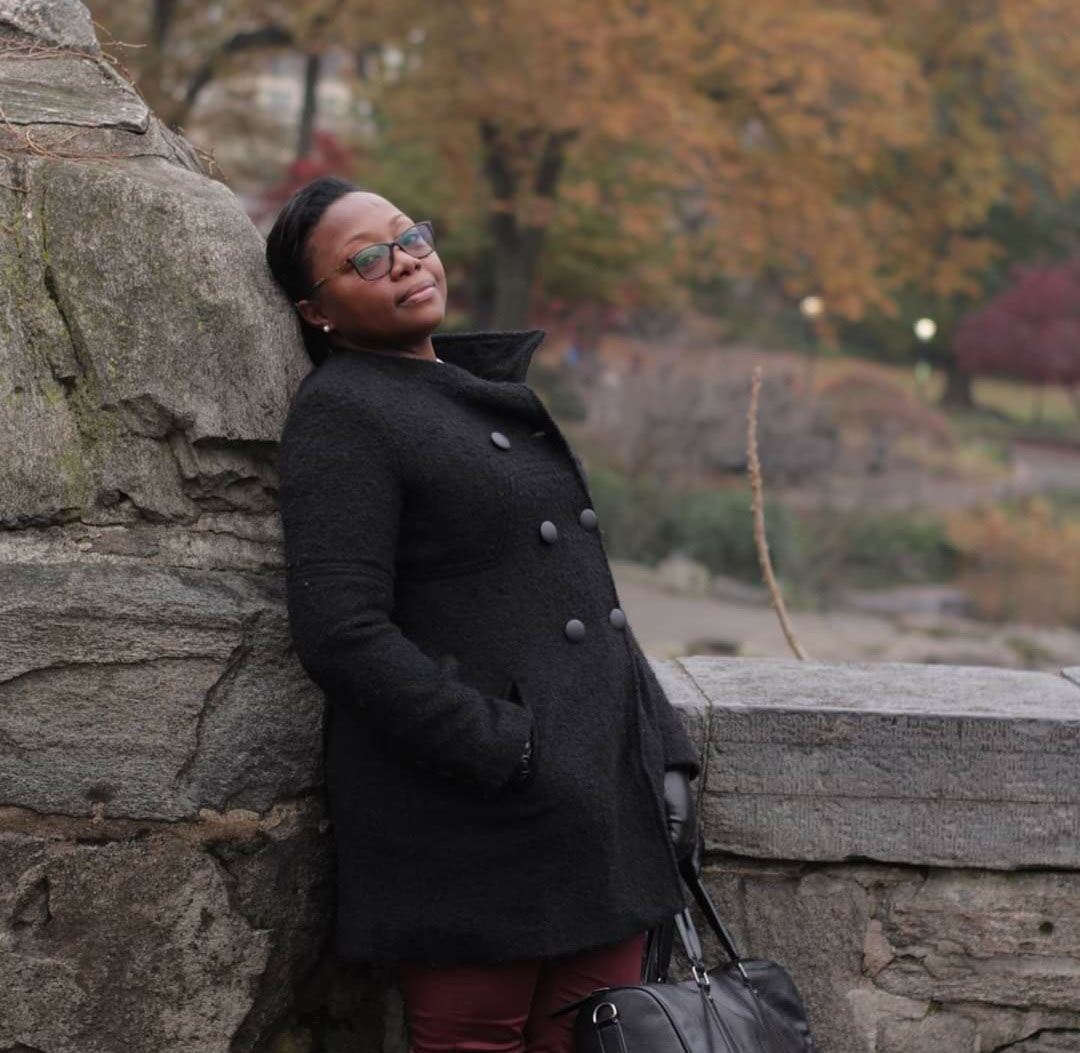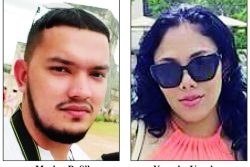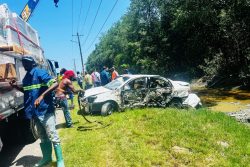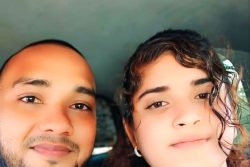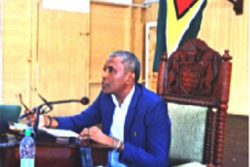“If you think gold mining is hard, the mining industry is harder to regulate and harder to manage because there are so many people with so many agendas, it is difficult to keep yourself on the straight and narrow—but keep yourself you must, if you want change,” says Urica Primus, founder member and President of the NGO, Guyana Women’s Miners’ Organisation (GWMO).
The 30-year-old, a businesswoman, who has chalked up years of service working in the mining industry, private sector, and in philanthropy, told Stabroek Weekend, “Because we are supporting women in mining and supporting communities affected by mining, it is difficult to be in spaces where people are making decisions on both.”
She added, “Sometimes I leave a meeting with people trying to make me feel that I am only supposed to be representing mining and not the communities that their negative impact may have [affected].”
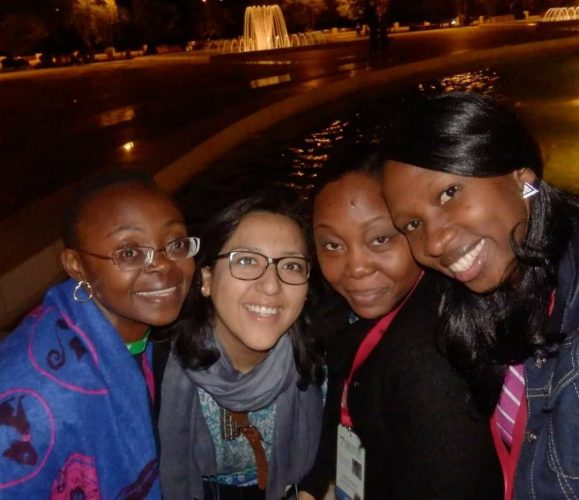
Although born in Georgetown, Primus grew up in Bartica with her maternal aunts, her miner-uncle John ‘Joel’ Charles, and cousins. Her mother died shortly after she was born.
Growing up, she learnt quickly as she was “her uncle’s shadow,” observing the loading of trucks in preparation for departure to the interior and travelling to Georgetown with him on business.
“When I was about eight years, I would help him write up receipts when workers were to be paid. At about ten years, he would give me the money and tell me how many drums of gas the trucks needed. I would ride to Shell, order it, pay, and ride back home on my bicycle.”
Her uncle, she said, had ways of teaching life’s lessons and one such had to do with dressing. “No matter how people dress and what they do, people are people,” he told her about her attitude at the time.
Recalling her determination as a child, she said, when she was about nine years she kept asking her uncle to teach her to drive. He kept ignoring her. She tried driving her uncle’s car and crashed it into the gate of the stairway. “The rule was, ‘tell the truth and you wouldn’t be penalized,’” she said. So she told her uncle before anyone else did. He took the car to the body workshop, fixed it and then taught her to drive.
Primus had her primary education at Bartica, and secondary education in Georgetown.
At 17 years, she took up the guardianship of a nephew – her brother’s son – who was then one year old. “He is now 14. I was still in sixth form at school.”
While in sixth form, she said, “Family members who were in mining would call me to send parts or to send in workers in the bush. Sometimes I would leave school at lunch, buy whatever was needed, send it off and then return. I still do that.”
When she was 18 years, her brother gave her a dredge. “I was already doing all the procurement, financial transactions and dealing with the human resources issues at the Georgetown end for my brother, aunt, uncle and father, so it was only a matter of getting one of my own.”
When she began volunteering with GWMO, she closed her operation to focus on successfully running an NGO that was expanding its scope of work.
Primus is pursuing a bachelor’s degree online. “It is working better for me. Even though I am very busy, I focus on doing three modules a year. I have one year left.”
In April 2015, she took part in the United Nations Alliance of Civilisation (UNAOC) youth leadership programme. “That leadership training was very timely because in August 2015 I was elected the GWMO’s president.” In 2017, she was coursed in negotiations and mediation training at Clingendael Institute in the Netherlands.
Safe home
When GWMO was founded in January 2012, Primus was elected second vice president. She later become first vice president. Before the 2015 general elections, she acted as president after its president Simona Broomes went into politics. She was 25 years when she was elected president. She has been re-elected twice since.
As President, she is the representative on a number of national boards and the director of the GWMO safe home the organisation runs with the Sisters of Mercy to support trafficking in persons (TIP) victims.
“Together we developed the Together in Peace (TIP) home, a positive spin on the acronym TIP given by Sister Judith, one of the leading nuns who worked on the development of the home.”
Most of the home’s furnishings were provided by the private sector and the Canadian Fund for Local Initiatives.
“Now we are able to provide victims with safe housing, skills training and psycho-social support before they return to their communities, thereby reducing the risk of being preyed on because of vulnerabilities. Without the home, people would have been rescued and reintegrated without going through core rehabilitative care.”
“Sadly, one of the youngest victims we have rescued was nine years and the youngest pregnant victim rescued was ten years. Both were from Indigenous Peoples communities in Region One. The parents sold the nine year old to a miner. She was basically forced to become a wife. In relation to the ten year-old, her father took her to the mines and sold her to different miners every time they needed money or food.”
In 2016, the GWMO was added to the Guyana Geology and Mines Commission (GGMC) board of directors. At the board’s first meeting in 2016, Primus was elected vice chairman (VC). She served as VC twice, in 2006 and 2019.
“They knew I was young but not how young I was until my birthday came around in November. People on the board who were comfortable working with the GWMO before would sometimes comment outside of the meeting about how young I was.”
Challenged both in terms of her age and gender, she said, at a GGMC board meeting where tasks were being divided, everything assigned to her was gender specific. “As though I knew nothing outside of countering issues that deal with sexual harassment.”
She added, “You have people who will invite you to meetings to hear your views and then at the end of it represent only theirs.”
In government’s 2020 allocation of benefits for mining, she said, “Applications for women were channeled through one entity that represents miners but not specifically women in mining. So with every change in administration, you have to lobby to ensure that women are included.”
She noted that a lot of people campaign on gender issues but then often times forget their campaign promises on assuming office.
Regulating the industry
From active mining and regulating the work of miners as a GGMC board member, Primus has shifted focus to working to create standards for the local mining industry as a member of CRAFT Code and Fairmined, two global entities dealing with due diligence.
“What isn’t as popular here is that the European Union will be putting due diligence regulations on mining globally. That is one standard we have not been actively involved in. We’re hoping that Guyana gets on board to start putting measures in place to ensure that human rights are respected in the mining industry. Every so often we see reports of workers complaining of not being paid, Indigenous persons taken to work and returning to communities without being paid, and other human rights violations occurring within mining districts.”
Led by Primus, the GWMO has also supported the Delve Initiative at the World Bank and the global NGO Pact in the creation of the Guyana profile.
“Through the University of Queensland, we are now serving as the regional knowledge exchange coordinator as part of the Delve exchange. Globally there is very little information available on the realities of mining across different countries. For donor countries to get a better understanding of what is happening and the level of support needed, Delve was formed as a platform for sharing information on ongoing initiatives and best practices being developed for the ASM (artisanal small-scale mining) community.”
Delve also aims to bring the Caribbean mining region together. “Even though it has recently started, we have been able to engage women in mining in Suriname and in quarrying in Trinidad. It is quite interesting to see that in some areas you think you are pioneering, you hear somebody else is doing it.” Guyana has the most mining associations in the Caribbean.
The first Delve webinar, focused on safe mining during COVID, will be held today. Primus noted that during 2020, the GWMO and Gold and Diamond Miners Association (GGDMA) had created their own guidelines for mining during the early part of COVID-19. The GWMO and GGDMA created a handbook for safe mining during COVID.
During the regional engagement, Primus realised that many other countries had not done anything similar. “Some simply adhered to the government guidelines but they may not be adequate for the activities involved in the production cycle.”
In follow up webinars, she said, “We would seek to address the topics miners would indicate they would like to learn about, especially, the challenges of transitioning to mercury-free mining, or techniques that reduce the use of mercury in mining, and in the GWMO, retooling of members.”
Noting that mining is not always able to sustain the family for an extended period because many miners mine without geological research, Primus said, in 2019 with the support of Conservation International (CI) Guyana, GWMO trained 18 of its members in a range of skills, including poultry rearing, tourism, hydroponic farming, business management and negotiations to expand their sources of income.
Primus has since received calls from women miners from other regions who want similar training their communities.
“We even had to arrange a meeting with all of the husbands because we had a controlling husband who didn’t see the need for his wife to be educated or being a part of the programme. If we had called one wife and husband alone it would have appeared she would have told us something that he would not have been comfortable sharing.”
The GWMO also trains women in public speaking and self-confidence, Primus noted. This proved useful to her when in 2018 she was due to make a presentation in Zambia but misplaced her passport and could not travel. One of the women who was representing the organisation and who had undertaken the same level of training as Primus, did the presentation. Based on the level of representation at different levels by its members, she said, she is assured that GWMO has capable leaders.
Combatting perceptions
People think women miners are either uneducated or are prostitutes, Primus said.
“You go to a meeting and you hear the most ignorant of remarks like ‘You wear makeup?’, ‘You’re too nice to be a miner’ or ‘You’re too polished to be a miner’.”
Some women are involved in prostitution in mining, she said, “but that is their choice.”
However, she noted that women own mining operations, own mining lands, are prospectors, and are working in the mines in different roles, such as medical doctors, engineers, geologists, as health and safety specialists, among other professions.
To counter the misconceptions, Primus said, in 2019, the GWMO in collaboration with World Wildlife Fund and the International Union for Conservation of Nature (IUCN) held a one-year programme on women in mining from across the country to talk about how they got into the industry.
At present, the GWMO has a membership of over 490 across the ten regions but has not met in an annual general meeting because of the COVID-19 restrictions.
During the period when they were supposed to be on full lockdown, Primus said, the GWMO was assisting in transporting children who were studying in the city to the interior. It realigned some of its funding from the Pan American Development Fund (PADF) for hampers for Guyanese and Venezuelan migrants in regions One, Four and Seven and assisted some mothers who had lost jobs and could not pay rent. With help from other agencies, it also gave assistance to regions Nine, Eight, Seven and Four.
“It was really overwhelming to see our members and communities putting together food hampers, cleaning and sanitising agents, toiletries, pampers, Vitamin C and masks for the vulnerable.”
Along with the hampers they sent out brochures and aluminium signs on trafficking in persons and crimes committed against children.
The GWMO has now revised the signs to suit children and the Ministry of Education has given approval to install the signs in Regions One, Four and Seven.
Noting that the Child Protection Agency has reported an increase in crimes against children during the pandemic, Primus said, the signs were created with support from PADF and the US government. “It is very critical that those signs are installed so children would know where to get help if they need it. Oftentimes, they are abused and the school is their only escape.”
Primus is also the Co-Chief Executive Officer of Stabroek Solutions, a relocation, real estate and administrative company. In 2019 she was the recipient of the national award, the Medal of Service.
